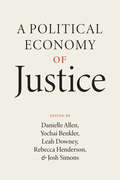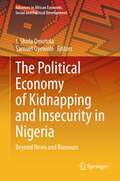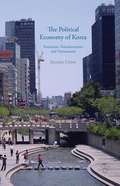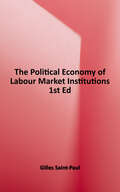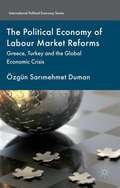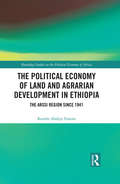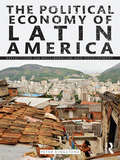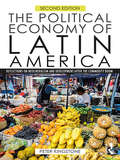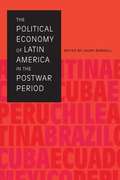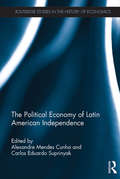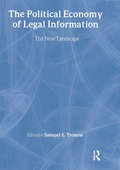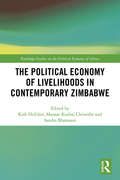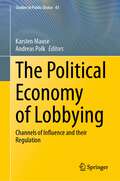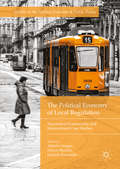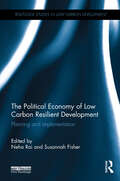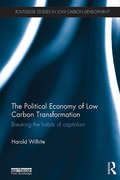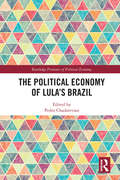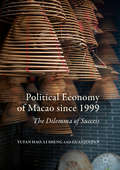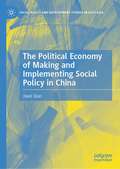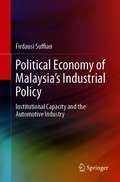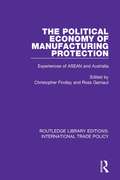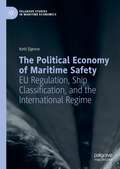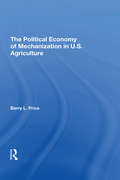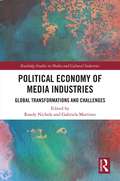- Table View
- List View
A Political Economy of Justice
by Leah DowneyDefining a just economy in a tenuous social-political time. If we can agree that our current social-political moment is tenuous and unsustainable—and indeed, that may be the only thing we can agree on right now—then how do markets, governments, and people interact in this next era of the world? A Political Economy of Justice considers the strained state of our political economy in terms of where it can go from here. The contributors to this timely and essential volume look squarely at how normative and positive questions about political economy interact with each other—and from that beginning, how to chart a way forward to a just economy. A Political Economy of Justice collects fourteen essays from prominent scholars across the social sciences, each writing in one of three lanes: the measures of a just political economy; the role of firms; and the roles of institutions and governments. The result is a wholly original and urgent new benchmark for the next stage of our democracy.
A Political Economy of Justice
by Leah DowneyDefining a just economy in a tenuous social-political time. If we can agree that our current social-political moment is tenuous and unsustainable—and indeed, that may be the only thing we can agree on right now—then how do markets, governments, and people interact in this next era of the world? A Political Economy of Justice considers the strained state of our political economy in terms of where it can go from here. The contributors to this timely and essential volume look squarely at how normative and positive questions about political economy interact with each other—and from that beginning, how to chart a way forward to a just economy. A Political Economy of Justice collects fourteen essays from prominent scholars across the social sciences, each writing in one of three lanes: the measures of a just political economy; the role of firms; and the roles of institutions and governments. The result is a wholly original and urgent new benchmark for the next stage of our democracy.
The Political Economy of Kidnapping and Insecurity in Nigeria: Beyond News and Rumours (Advances in African Economic, Social and Political Development)
by J. Shola Omotola Samuel OyewoleProviding unique perspectives on one of the leading hotspots of kidnapping in the world, this book examines the political and socioeconomic dimensions of the causes, manifestations, and consequences of kidnapping in Nigeria, as well as some of the control measures that have been adopted at different levels of governance and their effectiveness. The topics covered in the volume include details on the framework of understanding kidnapping, the evolution of kidnapping from pre-colonial to post-colonial eras, and the relationship between ungoverned spaces and kidnapping in the country. The book further sheds light on kidnapping in the context of insurgent campaigns, with insights into oil-related militancy in the Niger Delta region, with the Islamist Boko Haram insurgency and terrorism in the Northern region of Nigeria. It discusses non-insurgent kidnapping, situating kidnapping in the contexts of banditry, ransoming, ritualism, baby factory, and human trafficking. Additionally,the volume analyses the emerging gender and transnational frontiers of kidnapping in Nigeria. Expanding the discussion on state responses, this book also looks into responses of non-state actors to kidnapping as well as negotiations in hostage crisis management. Finally, it examines other unique subjects, such as media coverage of kidnapping, and the consequences for Nigeria’s international image. The book will appeal to students, scholars, and researchers of political science, international relations, economics, sociology, history, law and business management in general, as well as African studies, security studies, criminology, peace and conflict studies, and geography and area studies. It will also be helpful for public policy-makers, African security experts and professionals, as well as business managers, risk analysists and insurance industry that are interested in a better understanding of kidnapping and associated political, social, economic, and security dynamicsin Nigeria and beyond.
The Political Economy Of Korea
by Jitendra UttamKorea's twin transitions - agrarian to industrial and industrial to post-industrial - transformed the country's political economy. Moving away from the traditional focus on aspects such as market, culture, and colonialism, the author argues that Korea's 'second state' was revitalized through the 'people's movement' and 'citizens movement'.
The Political Economy of Labour Market Institutions
by Gilles Saint-PaulAccording to most orthodox economists, labour market rigidities are the key culprit for such high unemployment as has been observed in Europe during the past three decades. But governments that have attempted to follow the standard prescription of removing rigidities have often faced harsh political opposition. This book looks at why labour market institutions such as employment protection, unemployment benefits, and relative wage rigidities exist, what role they play in society, why they seem so persistent, where the pressure to reform them comes from, and whether reform can be politically viable or not. The book ascribes a central role to the existence of underlying microeconomic frictions and to redistributive pressures between rich and poor, and shows how these ingredients may give rise to labour market rents, which in turn explain why a coherent set of rigidities arise as the outcome of the political process. It is also shown that, at the same time, such rents create resistance to reform, and contribute to locking society into a high-unemployment, rigid equilibrium. Finally, the basic principles exposed in the book are used to discuss various strategies for a successful labour marketer form.
The Political Economy Of Labour Market Reforms: Greece, Turkey and the Global Economic Crisis
by Özgün Sarımehmet DumanDuman examines the transition from Keynesianism to monetarism by presenting an analysis of labour market reforms in Greece and Turkey - questioning the role of class struggle on the implementation process. She also scrutinises the influence of the global economic crisis and the execution of reform policies in these two countries.
The Political Economy of Land and Agrarian Development in Ethiopia: The Arssi Region since 1941 (Routledge Studies on the Political Economy of Africa)
by Ketebo Abdiyo EnseneLocated in central Ethiopia, the Arssi region is one of the most productive in Ethiopia yet it has so far been neglected by scholars. This book scrutinizes the rural development of Arssi by focusing on the Swedish supported experimental venture known as the Chilalo Agricultural Development Unit (CADU) and later as the Arssi Rural Development Unit (ARDU). <P><P>Ketebo Abdiyo Ensene investigates how effectively this strategy empowered the peasantry to change their farming techniques and produce beyond subsistence level. He also examines the accumulation of alienated land by the northern Ethiopian nobility through land grants, fake purchases, and other futile means of land grabs and the impact that this had on the native population. Finally, the book reassess the importance of the rural land reform of 1975 that followed the collapses of the imperial regime and argues that this was the most significant event in the history of agricultural development in Ethiopia. The assessment of the book in fact goes into the post-1991 period in relation with agrarian development. <P><P>The Political Economy of Land and Agrarian Development in Ethiopia will be of interest to scholars of Ethiopia, African Studies, economic history, political economy, development and agriculture.
The Political Economy of Latin America: Reflections on Neoliberalism and Development
by Peter KingstoneNeoliberalism has been at the centre of enormous controversy since its first appearance in Latin America in the early 1970s. Even neoliberalism’s strongest supporters concede that it has not lived up to its promises and that growth, poverty, and inequality all have performed considerably worse than hoped. This brief text offers an unbiased reflection on the neoliberal debate in Latin America and the institutional puzzle that underlies the region’s difficulties with democratization and development. In addition to providing an overview of this key element of the Latin American political economy, Peter Kingstone also advances an important but under-explored argument about political institutions. Kingstone offers a unique contribution by mapping out the problem of how to understand institutions, why they are created, and why Latin American ones function the way they do.
The Political Economy of Latin America: Reflections on Neoliberalism and Development after the Commodity Boom
by Peter KingstoneThis brief text offers an unbiased reflection on debates about neoliberalism and its alternatives in Latin America with an emphasis on the institutional puzzle that underlies the region’s difficulties with democratization and development. In addition to providing an overview of this key element of the Latin American political economy, Peter Kingstone also advances the argument that both state-led and market-led solutions depend on effective institutions, but little is known about how and why they emerge. Kingstone offers a unique contribution by mapping out the problem of how to understand institutions, why they are created, and why Latin American ones limit democratic development. This timely and thorough update includes:?? A fresh discussion of the commodity boom in the region and the resulting "Golden Era" in Latin America;? The recent explosion of social policy innovation and concerns about the durability of social reform after the boom;? A discussion of the knowledge economy and the limits to economic growth, with case studies of successful examples of fostering innovation.
The Political Economy of Latin America in the Postwar Period
by Laura RandallThe historic and increasing interdependence of the Latin American and U. S. economies makes an understanding of the political economies of Latin American nations particularly timely and important. After World War II, many nations initially implemented import substituting industrialization policies. Their outcomes, and the shift in policies, are related to the domestic policies and world economic conditions that led to government deficits, inflation, foreign borrowing, debt renegotiation, and renewed emphasis on common markets and other devices to stimulate trade and investment. In The Political Economy of Latin America in the Postwar Period, important policy measures are evaluated, such as indexation of prices and contracts; special provisions for financing the government through the Central Bank; stabilization; and deregulation of the economy. The introduction presents trends in Latin American growth and the factors that influence them. This is followed by parallel studies of the economic development of Argentina, Brazil, Chile, Cuba, Ecuador, Mexico, and Peru from 1945 to the mid-1990s. Noted experts bring their considerable experience to analyzing the content and impact of the economic theories that guided policymaking and their effects on output, income, and quality of life. The historic and increasing interdependence of the Latin American and U. S. economies makes an understanding of the political economies of Latin American nations particularly timely and important. After World War II, many nations initially implemented import substituting industrialization policies. Their outcomes, and the shift in policies, are related to the domestic policies and world economic conditions that led to government deficits, inflation, foreign borrowing, debt renegotiation, and renewed emphasis on common markets and other devices to stimulate trade and investment. In The Political Economy of Latin America in the Postwar Period, important policy measures are evaluated, such as indexation of prices and contracts; special provisions for financing the government through the Central Bank; stabilization; and deregulation of the economy. The introduction presents trends in Latin American growth and the factors that influence them. This is followed by parallel studies of the economic development of Argentina, Brazil, Chile, Cuba, Ecuador, Mexico, and Peru from 1945 to the mid-1990s. Noted experts bring their considerable experience to analyzing the content and impact of the economic theories that guided policymaking and their effects on output, income, and quality of life.
The Political Economy of Latin American Independence (Routledge Studies in the History of Economics)
by Alexandre Mendes Cunha Carlos Eduardo SuprinyakAlthough historians usually trace its origins to the Haitian Revolution of the late 18th Century, Latin American political, economic and cultural emancipation is still very much a work in progress. As new national identities were developed, fresh reflection and theorising was needed in order to understand how Latin America related to the wider world. Through a series of case studies on different topics and national experiences, this volume shows how political economy has occupied an important place in discussions about emancipation and independence that occurred in the region. The production of political economic knowledge in the periphery of capitalism can take on many forms: importing ideas from abroad; translating and adapting them to local realities; or else producing concepts and theories specifically designed to make sense of the uniqueness of particular historical experiences. The Political Economy of Latin American Independence illustrates each of these strategies, exploring issues such as trade policy, money and banking, socio-economic philosophy, nationalism, and economic development. The expert authors stress how the originality of Latin American economic thought often resides in the creative appropriation of ideas originally devised in different contexts and thus usually ill-suited to local realities. Taken together, the chapters illustrate a fertile methodological approach for studying the history of political economy in Latin America. This book is of great interest to economic historians specialising in Latin America, as well as those who study history of economic thought, political economy and Latin American history.
The Political Economy of Legal Information: The New Landscape
by Samuel E TrosowFrom the informative information contained in The Political Economy of Legal Information: The New Landscape, you will discover how you, as a librarian or other information professional, can comprehend, cope with, and even try to influence the factors which comprise the new legal information landscape. You will discover the great changes in the legal publishing industry that have occurred within the last few years and the new ways in which legal information is produced, stored, disseminated, and used. The Political Economy of Legal Information will provide you with valuable tips to help you make sense of this new landscape so your library can reap the benefits of this new age. This informative book provides you with a collection of essays that describe, asses, and evaluate the political economy of information in the changing realm of legal publishing to keep you and your library on top of this dynamic situation. Through The Political Economy of Legal Information, you will find valuable insight into how you can make adjustments to constant technological changes by: confronting the cost efficiency model which promises both lower prices and greater effectiveness to help you make informed decisions about your library's technology learning about the economic logic of copyright laws to safeguard your library's reliance on big-name databases exploring the new Legal Publishers’List that provides a roadmap to the mergers and acquisitions that have characterized the publishing industry in recent years in order to choose the best manufacturer of the legal products in your library exploring case studies to help you understand how educational institutions, governmental entities, and small publishers can successfully cope with the new information landscape and to keep you informed of all the options available to your libraryWritten by a wide cross section of people who are working with legal information,The Political Economy of Legal Information provides essential information to assist you and your library in staying informed regarding the fast-paced world of legal publishing.
The Political Economy of Livelihoods in Contemporary Zimbabwe (Routledge Studies on the Political Economy of Africa)
by Kirk Helliker Manase Kudzai Chiweshe Sandra BhatasaraSince the introduction of the fast track land reform programme in 2000, Zimbabwe has undergone major economic and political shifts and these have had a profound impact on both urban and rural livelihoods. This book provides rich empirical studies that examine a range of multi-faceted and contested livelihoods within the context of systemic crises. Taking a broad political economy approach, the chapters advance a grounded and in-depth understanding of emerging and shifting livelihood processes, strategies and resilience that foregrounds agency at household level. Highlighting an emergent scholarship amongst young black scholars in Zimbabwe, and providing an understanding of how people and communities respond to socio-economic challenges, this book is an important read for scholars of African political economy, southern African studies and livelihoods.
The Political Economy of Lobbying: Channels of Influence and their Regulation (Studies in Public Choice #43)
by Karsten Mause Andreas PolkLobbying is not only the subject of ongoing, heated debates in politics and the public sphere but has also been a focus of the social sciences for decades. This edited volume provides an overview of the current state of research on lobbying from the perspective of Public Choice as a subfield of political science and economics. After a brief introduction to the field, Part I provides an overview of basic concepts and political-economic theories of lobbying from the standpoints of various subfields of Public Choice. Subsequently, Part II investigates the various channels used by interest groups to influence policymakers, such as party donations, informational lobbying, hiring politicians, etc. These chapters also discuss the possibilities and limits of regulating the respective channels. Lastly, Part III sheds light on lobbying in selected regions (i.e., the United States, European Union, Russia, and China).
The Political Economy of Local Regulation
by Alberto Asquer Franco Becchis Daniele RussolilloThis book offers theoretical and methodological guidelines for researching the complex regulation of local infrastructure, utilities and public services in the context of rapid urbanisation, technological change, and climate change. It examines the interactions between regulators, public officers, infrastructure and utilities firms, public service providers, citizens, and civil society organisations. It contains contributions from academics and practitioners from various disciplinary perspectives and from many regions of the world, illustrated with case studies from several sectors including water, natural gas and electricity distribution, local public transport, district heating, urban waste, and environmental services.
The Political Economy of Low Carbon Resilient Development: Planning and implementation (Routledge Studies in Low Carbon Development)
by Susannah Fisher Neha RaiOver the last decade, policies and financing decisions aiming to support low carbon resilient development within the least developed countries have been implemented across several regions. Some governments are steered by international frameworks, such as the UN Framework Convention on Climate Change (UNFCCC), while others take their own approach to planning and implementing climate resilient actions. Within these diverse approaches however, there are unspoken assumptions and normative assessments of what the solutions to climate change are, who the most appropriate actors are and who should benefit from these actions. This book examines the political economy dynamics or the underlying values, knowledge, discourses, resources and power relationships behind decisions that support low carbon resilient development in the least developed countries. While much has been written on the politics of climate change, this book will focus on the political economy of national planning and the ways in which the least developed countries are moving from climate resilient planning to implementation. The book will use empirical evidence of low carbon resilient development planning in four countries: Bangladesh, Ethiopia, Rwanda and Nepal. Different approaches to low carbon resilience are critically analysed based on detailed analysis of key policy areas. This book will be of great interest to policy makers, practitioners’ students and scholars of climate change and sustainable development.
The Political Economy of Low Carbon Transformation: Breaking the habits of capitalism (Routledge Studies in Low Carbon Development)
by Harold WilhiteDeep reductions in energy use and carbon emissions will not be possible within political economies that are driven by the capitalist imperatives of growth, commodification and individualization. As such, it has now become necessary to understand the relationship between capitalism and the emergence of high energy habits. Using the examples of home energy, transport and food, The Political Economy of Low Carbon Transformation articulates the relationship between the politics of economic expansion and the formation of high-energy habits at the level of family and household. The book elaborates a theory of habit and how it can contribute to this relationship. It critiques mainstream green economy and green energy prescriptions for low carbon transformation that take economic growth for granted and ignore habits formed in a material world designed and built for high energy use. The book explores the growing number of communities around the world that are engaged in collaborative efforts to reform their community and household habits in ways that are less environmentally intrusive. It assesses their potential to make an impact on national and urban low carbon political agendas. The book is aimed at a large and growing interdisciplinary audience interested in the relationship between political economy, consumption and sustainability.
The Political Economy of Lula’s Brazil (Routledge Frontiers of Political Economy)
by Pedro ChadarevianThe Political Economy of Lula’s Brazil describes the social, political and economic transformations that led to increased interest in the tropical giant at the start of the 21st century. This volume demonstrates that Brazil’s rise was the result of the adoption of heterodox economic policies, while also highlighting the obstacles to choosing an egalitarian development path in Latin America. Adopting an innovative perspective in terms of methodology and interpretation, contributors from Brazil, Latin America and France follow a non-dogmatic critical approach in order to explain the institutional changes that made a new cycle of development possible in Brazil. The authors also argue that the evolution of Brazil, following the implementation of leftist policies, paradoxically gave birth to several economic, political and environmental contradictions. They contend that these contradictions, including the falling rate of profit linked to the full employment of resources; the redistributive process seen as a menace by the conservative middle classes; and the growing intervention of the state in the different markets, eventually led to the end of the early 21st century development cycle. Providing clues to understanding the contradictory and painful path towards the development of semi-industrialised countries, this book will interest students and academics in the fields of economics, sociology, history and political science. The story it tells may also interest all those searching for independent analysis of the successes and failures of Lula’s Brazil.
Political Economy of Macao since 1999
by Yufan Hao Li Sheng Guanjin PanThis book takes a comprehensive look at the governance and civil society of Macao, the shadowy mecca of gambling in Asia- and the reforms, changes, and social movements which are challenging that reputation today. Macao has experienced spectacular economic growth since it returned to Chinese rule in 1999. Following double-digit rates of economic growth between 2002 and 2013, Macao has become one of the wealthiest regions in Asia, with its GDP per capita rising from USD$14,258 in 2001 to USD$89,333 in 2014. Macao's prosperity over the past decade can be largely attributed to the government's decision to liberalize the casino industry in 2002 and the Chinese central government's facilitation of individual travel (FIT) scheme implemented in 2003. The casino industry has become the sole pillar of the local economy, overshadowing all other economic sectors. The increasing dependence on the casino industry has also made Macao's economy highly vulnerable and difficult to sustain. The authors lay out a comprehensive and well-argued case against the economic monoculture, in the process creating a book of profound interest to scholars of greater China, students of political economy, and travelers to the Macau.
The Political Economy of Making and Implementing Social Policy in China (Social Policy and Development Studies in East Asia)
by Jiwei QianThis book explores the institutional factors in social policymaking and implementation in China. From the performance evaluation system for local cadres to the intergovernmental fiscal system, local policy experimentation, logrolling among government departments, and the “top-level” design, there are a number of factors that make policy in China less than straightforward. The book argues that it is bureaucratic incentive structure lead to a fragmented and stratified welfare system in China. Using a variety of Chinese- and English-language sources, including central and local government documents, budgetary data, household surveys, media databases, etc., this book covers the development of China’s pensions, health insurance, unemployment insurance, and social assistance programs since the 1990s, with a focus on initiatives since the outbreak of the COVID-19 pandemic. Providing a deeper understanding of policymaking and implementation in China, this book interests scholars of public administration, political economy, Asian politics, and social development.
Political Economy of Malaysia’s Industrial Policy: Institutional Capacity and the Automotive Industry (Springerbriefs In Political Science Ser.)
by Firdausi SuffianThis book examines the national automotive policy in Malaysia to help readers gain an understanding of the country’s industrial policy-making processes. Addressing a gap in analysis of the political economy of the national automotive policy, the research presented combines the new institutional theory and the developmental state approach to provide new insights into elite policymakers’ measures to shield domestic automotive enterprises from pro-market reforms. The formation of the national car project marks a turning point for Malaysia's industrial development as a country, which it envisions will lead to it becoming a major player in the global automotive market. However, the domestic institutional factors embedded in ethno-economic interests and patronage constrain national car-makers, limiting their potential to grow, and instead causing a slowdown in the industry.Allowing readers to understand the background to Malaysia’s heavy industrialisation programme and the birth of its national car projects, this book critically discusses the significance of institutional context in policy outcomes, and highlights how institutions and policies have impact growth or decline. It is a valuable resource relevant to analysts, researchers and students who are interested in the political economy of the national industrial policy and automotive industry in Malaysia and beyond.
The Political Economy of Manufacturing Protection: Experiences of ASEAN and Australia (Routledge Library Editions: International Trade Policy #19)
by Christopher Findlay Ross GarnautProtection is a persistent feature of economic policy in developed and developing countries alike. However, it is now widely accepted that high protection holds back economic growth. Why is protection so pervasive when it is widely recognised to be against the national interest of the countries which impose it? This contradiction is the focus of this important volume, first published in 1986. Economists from the Philippines, Thailand, Malaysia, Singapore and Australia have written about their countries and draw conclusions on the causes of protection from statistical analysis and from interindustry structure.
The Political Economy of Maritime Safety: EU Regulation, Ship Classification, and the International Regime (Palgrave Studies in Maritime Economics)
by Ketil DjønneThis book offers unique insight into the public and private governance of international shipping from the 1970s through to the 2010s. Focusing on the part played by maritime classification societies, it highlights the role played by the European Union during this time and its influence in creating transnational maritime regulations. The emergence of the Treaty of Rome and the European Parliament in enabling market liberalisation within the shipping industry on the one hand and more stringent maritime safety regulation on the other is examined, alongside the common transport policy and enforcement of international maritime rules. Particularly attention is given to the growth of the European Union’s maritime presence, the establishment of the European Maritime Safety Agency, developments in flag state implementation, and relations between the International Maritime Organization and the European Union. This book presents a detailed guide to the European Union’s role as a maritime safety regulator and the impact this has had on the shipping industry and its governance structure. It will be relevant to researchers and policymakers interested in maritime and transport economics as well as to students of European affairs and of international relations.
The Political Economy Of Mechanization In U.s. Agriculture
by Barry PriceFor more than a decade the trend toward increased mechanization in U.S. agriculture has been the source of farm worker protests, legislative hearings, and lawsuits. (The recent case pitting the University of California’s prestigious agriculture research establishment against Cesar Chavez and the United Farm Workers is a prominent example of such litigation.) A key question in the controversy is whether federal and state governments should continue to invest more than $1 billion per year in the development of large-scale, capital-intensive technologies known to have significant social costs. Opponents of continued public support for these new technologies argue that they will eliminate thousands of farm jobs when the nation already suffers from a serious unemployment problem; proponents contend that such capital-intensive technologies keep food prices down for consumers while generating the potential for increased wages for farm workers. This book explores both sides of the debate, tracing the history of the mechanization issue and assessing the economic and sociological bases of the opposing positions. Maintaining that present methods of analysis are not adequate for resolving the conflict, Professor Price suggests an alternative approach, highlighted by a detailed case study of the costs and benefits generated by a new harvest technology adopted in the tomato-processing industry in California. He singles out the role of market structure as the most important variable in the distribution of benefits resulting from mechanization. Finally he relates his research findings to policy alternatives concerning farm mechanization in general, as well as to other problems involving technological change.
Political Economy of Media Industries: Global Transformations and Challenges (Routledge Studies in Media and Cultural Industries)
by Randy Nichols Gabriela MartinezThis book provides a critical political economic examination of the impact of increasingly concentrated global media industries. It addresses different media and communication industries from around the globe, including film, television, music, journalism, telecommunication, and information industries. The authors use case studies to examine how changing methods of production and distribution are impacting a variety of issues including globalization, environmental devastation, and the shifting role of the State. This collection finds communication at a historical moment in which capitalist control of media and communication is the default status and, so, because of the increasing levels of concentration globally allows those in control to define the default ideological status. In turn, these concentrated media forces are deployed under the guise of entertainment but with a mind towards further concentration and control of the media apparatuses many times in convergence with others
